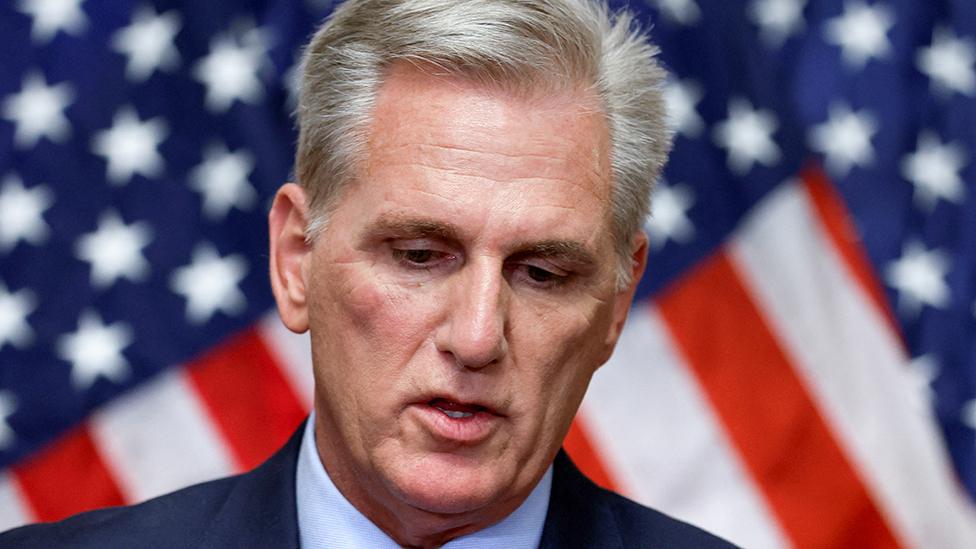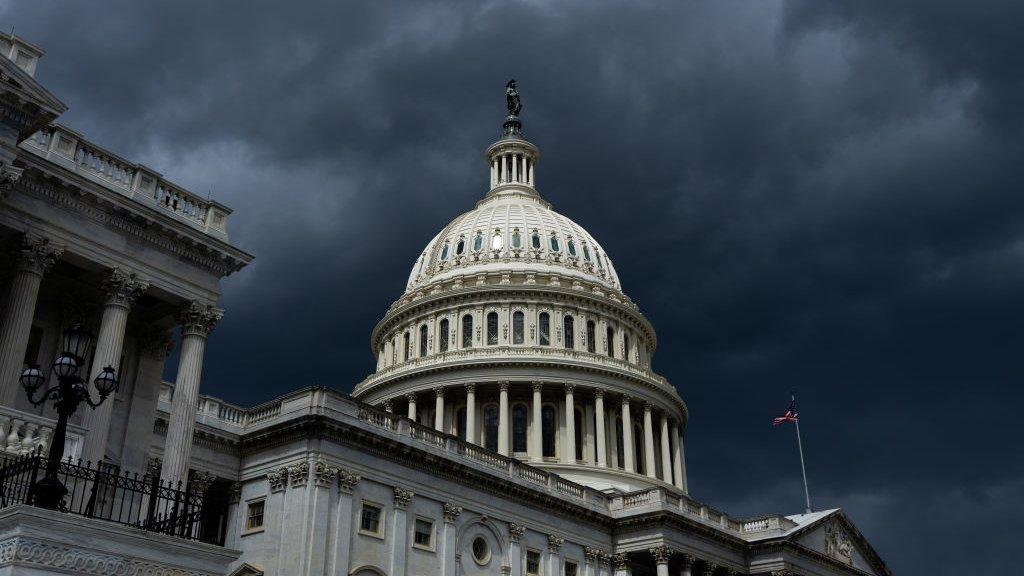House Republicans face choice - Trump's man or the insider
- Published

The race to replace Kevin McCarthy as Speaker of the US House of Representatives is underway, and Republicans are currently being confronted with two very different choices that could represent two different paths for the party - and Congress itself.
House Republican Whip Steve Scalise and House Judiciary Committee chairman Jim Jordan are currently the two most prominent candidates. While their policy positions are similar - both are staunch conservatives who oppose abortion and gun restrictions, support more stringent immigration policies, want to slash government spending, and back Donald Trump - the two have wildly different styles that could determine how House Republicans operate for the foreseeable future.
Mr Scalise has risen through the ranks of the House Republicans through shrewd manoeuvring and an insider's ability to effectively whip votes. As the number two Republican in the House, ascending to the top leadership post is a natural progression for him.
Mr Jordan, however, is far more of a firebrand, and has become a favourite among the Republican base for his distrust of the federal government and public displays of allegiance to Donald Trump. As a result, he has become far more associated with Mr Trump and the "Make America Great Again" movement.
"The contrast between them is, Steve Scalise is more establishment, and Jim Jordan is more anti-establishment, more populist," said Laura Blessing, senior fellow at the Government Affairs Institute at Georgetown University. "You've got an establishment versus insurgent energy."
In essence, Ms Blessing said, it was a choice between maintaining a semblance of the status quo that the House saw under Mr McCarthy, or heading towards a governing style laced with an obstructionist attitude.
Congress now faces a November deadline to agree on legislation to fund the government and avert a shutdown.
In Mr Jordan, Republicans have a candidate that "opens up a very real possibility of prolonged shutdowns or similar activity", Ms Blessing said.
"If you are looking for someone who is more likely to avert shutdowns, be more of a voice for the establishment, that appears to be Steve Scalise," she said.
Their reasoning for seeking the job has played out along these divisions.
Mr Scalise is pitching himself as a Speaker who could work through the rancorous divisions in Congress, particularly among Republicans.
"Look, the conversations right now are: How do we get back on track? How we come back together?" Mr Scalise told reporters Friday. "My background is somebody who's built coalitions, who has united Republicans to come together on really tough things."
In a letter announcing his candidacy, Mr Jordan used more heated partisan language, saying: "Far-left progressive policies are destroying our communities, our security, and our future."
The stylistic distinction is important, because their influence will be felt beyond Washington DC.
Watch: The moment McCarthy is removed as House speaker
Whoever takes the helm will play a major role in setting the national party's agenda - and tone. And like the House Republicans, the party overall has been grappling with a similar populist versus establishment dynamic for years.
That connection to the overall party battles was made explicit when Mr Trump elbowed his way into the contest and endorsed Mr Jordan for Speaker.
Florida Governor Ron DeSantis, who is challenging Mr Trump, said that both candidates are "good guys" but added: "You can't just say, continue business as usual. You got to be somebody that understands we need a fundamentally different path here."
Republicans who oppose or seek to move on past Mr Trump have spoken against Mr Jordan's candidacy for Speaker, casting him as an extreme candidate.
The have specifically called out Mr Jordan's actions around the 6 January 2021 attack on the US Capitol, when pro-Trump rioters stormed Congress in an attempt to stop the certification of Joe Biden's election. (Both Mr Scalise and Mr Jordan voted against certifying legitimate election results for Mr Biden.)
"Jim Jordan knew more about what Donald Trump had planned for January 6 than any other member of the House of Representatives," said former Rep Liz Cheney, who was Republican co-chair of the House committee investigating the attack and was later ousted from Congress.
Cassidy Hutchinson, a former Trump White House aide who testified before the House committee, said in a recent interview that "Jim can't be trusted with the Constitution."
"Jim Jordan was privy to nearly everything, if not everything, about and pertaining to January 6," she said.
In the coming days, one of these men must convince 218 of their colleagues to vote for them for Speaker.
Regardless of who wins, the next Speaker will have at least one major problem on their plate.
"I think the institution of the speakership has been damaged," said Doug Heye, a former Republican spokesman.
"The next speaker is going to have to work to repair that."
Related topics
- Published6 October 2023

- Published4 October 2023

- Published4 October 2023
